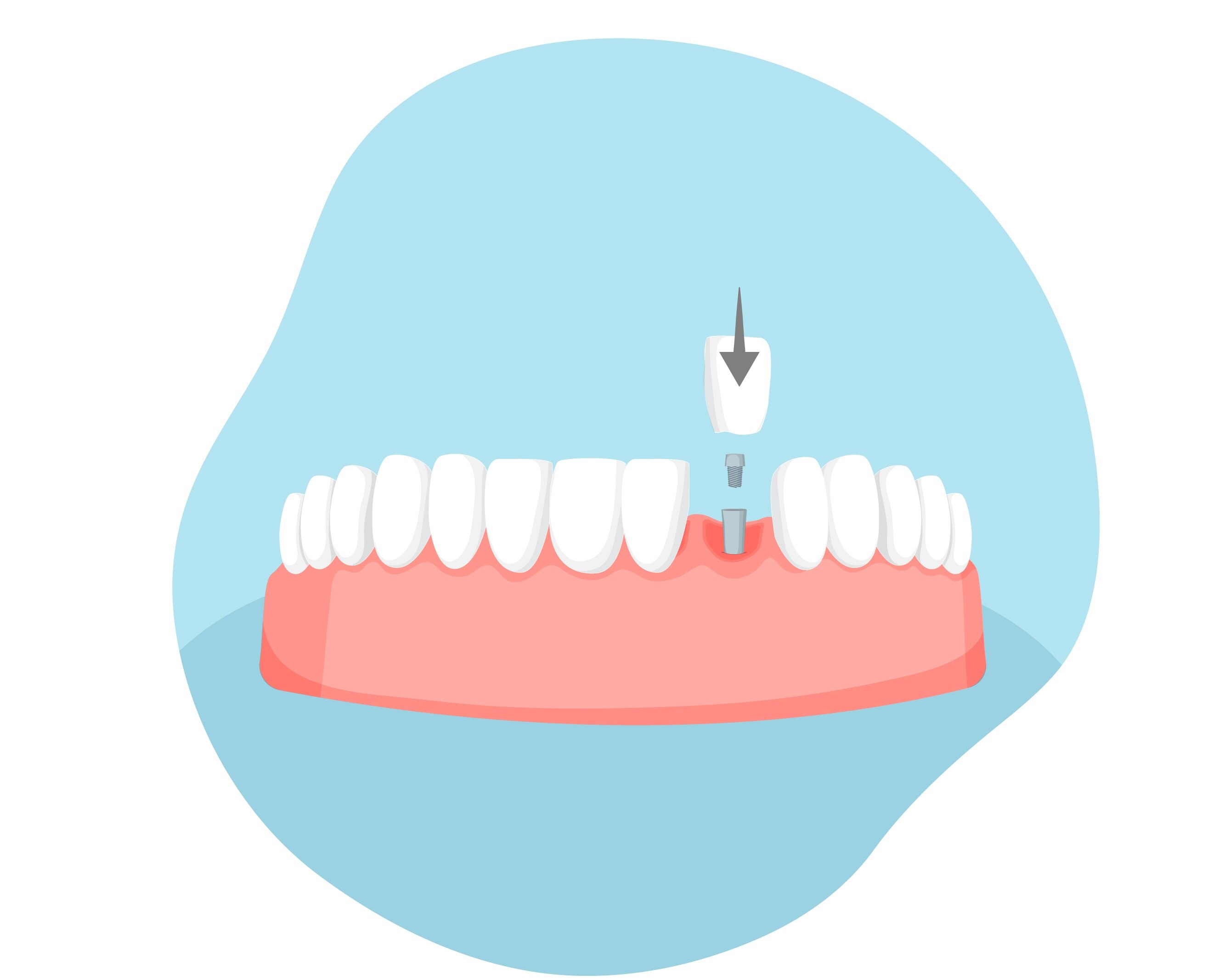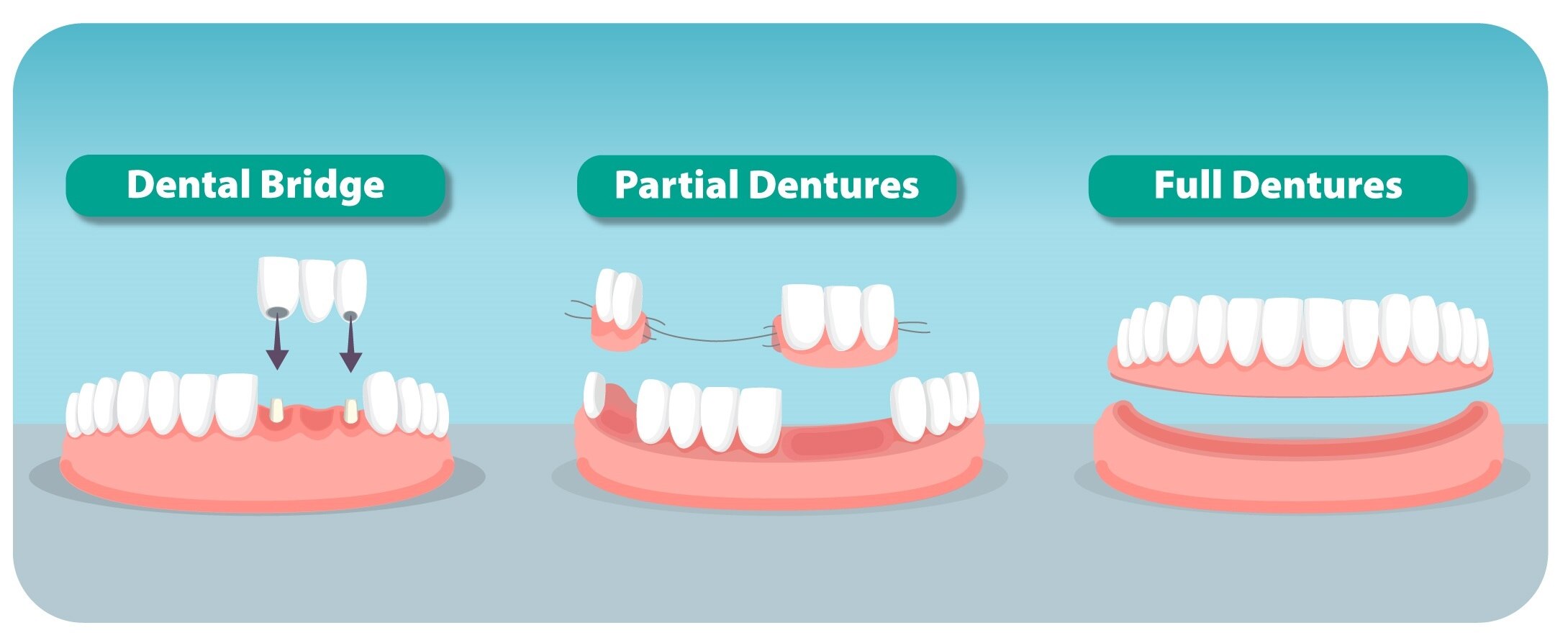
Do you close your lips when you smile because you have missing teeth? Or maybe you have a damaged tooth that’s been snagging on apple skin (and everything else) for years. Dental implants may be the key to permanently transforming your smile into one you’ll be happy to share, and one that feels natural, too.
What Are Dental Implants?

Dental implants are man-made, permanent replacement tooth roots. Doctors create these artificial roots by surgically attaching a screwlike post into the jaw. They can then attach artificial teeth (like dental crowns, bridges or dentures) to the roots.1
Dental implants can replace a single tooth, several teeth or all of the teeth. And because dental implants fit, feel and function like natural teeth, they can be a great option if you have missing or damaged teeth or chronic dental problems.2
Types of dental implants
There are many options when it comes to dental implants, and your dentist will help you select the best fit for your needs. Some common types of dental implants include:3
- 3-on-6
- All-on-4®
- Endosteal implants
- Endosteal implant with bone augmentation
- Immediate-load implants
- Implant-supported bridge
- Single tooth implant
- Subperiosteal dental implants
- Zygomatic implants
What are dental implants made of?
Dental implants are usually made from titanium alloy. It’s a metal that’s as strong as steel but lighter in weight and resistant to corrosion. Titanium is nontoxic, biocompatible and safe to implant in the body.4
How Much Do Dental Implants Cost?
The national average cost* for a single tooth dental implant is $2,143, but the cost ranges from $1,646 to $4157.6 This includes the process and material for implanting the artificial root but doesn’t include the cost of the dental crown.5 Individual crowns can range from $488 to $3,254, depending on the material.6
And if you’re looking for a full mouth transformation, you may consider dental reconstruction, or a “smile makeover.” This transformative process can include multiple dental implants, crowns, veneers, teeth bonding, contouring and even whitening to enhance each tooth and elevate your smile.
Average cost of dental implants by type
Below is the average cost* of dental implants by type:6
| Type of dental implant | Average cost |
|---|---|
| 3-on-6 | $12,474 |
| All-on-4 | $15,176 |
| Endosteal implants | $4,344 |
| Endosteal implant with bone augmentation | $5,580 |
| Immediate-load implants | $3,255 |
| Implant-supported bridge | $5,195 |
| Single tooth implant | $2,143 |
| Subperiosteal dental implants | $2,804 |
| Zygomatic implants | $3,918 |
Average cost of dental implants by state/district
Below is a breakdown of the average cost* per single-tooth dental implant in all 50 states and the District of Columbia. Prices do not include the cost of the crown, tooth extraction (for damaged teeth) or office-related fees.6
| State/District | Average cost |
|---|---|
| Alabama | $1,790 |
| Alaska | $2,595 |
| Arizona | $2,138 |
| Arkansas | $1,825 |
| California | $2,730 |
| Colorado | $2,161 |
| Connecticut | $2,230 |
| Delaware | $2,129 |
| District of Columbia | $2,518 |
| Florida | $2,130 |
| Georgia | $1,962 |
| Hawaii | $3,565 |
| Idaho | $2,165 |
| Illinois | $2,207 |
| Indiana | $1,903 |
| Iowa | $1,861 |
| Kansas | $1,891 |
| Kentucky | $1,930 |
| Louisiana | $1,932 |
| Maine | $2,191 |
| Maryland | $2,454 |
| Massachusetts | $2,781 |
| Michigan | $1,951 |
| Minnesota | $2,012 |
| Mississippi | $1,848 |
| Missouri | $1,866 |
| Montana | $2,092 |
| Nebraska | $1,909 |
| Nevada | $2,120 |
| New Hampshire | $2,232 |
| New Jersey | $2,255 |
| New Mexico | $1,939 |
| New York | $2,223 |
| North Carolina | $1,964 |
| North Dakota | $1,955 |
| Ohio | $1,989 |
| Oklahoma | $1,806 |
| Oregon | $2,294 |
| Pennsylvania | $2,067 |
| Rhode Island | $2,342 |
| South Carolina | $1,953 |
| South Dakota | $1,900 |
| Tennessee | $1,935 |
| Texas | $1,972 |
| Utah | $2,129 |
| Vermont | $2,241 |
| Virginia | $2,095 |
| Washington | $2,428 |
| West Virginia | $1,893 |
| Wisconsin | $2,001 |
| Wyoming | $1,980 |
Does Dental Insurance Cover Implants?
Some dental insurance providers consider dental implants as an elective procedure, which isn't covered by insurance. But, some plans may help you pay for the implant crown, so it’s a good idea to check with your insurance provider.7
If not covered, you might consider asking your dentist if they offer payment plans. Many dentistry and cosmetic dentistry practices accept the CareCredit credit card, which may be a convenient way to pay for dental implants over time.**
Getting Dental Implants: How It Works
Getting dental implants is a multistep process that can take several months. You can generally expect the process of getting dental implants to look like this:8
- Consultation. Your dentist may refer you to an oral surgeon. You’ll work with your dental care team to determine if implants are a good choice for you, and if so, what kind and how many.
- Preparation. Your dentist will make sure your mouth is ready to receive the implants. This may require them to remove any damaged teeth or tissue and clean and sterilize your mouth. If extraction is required, you’ll be given either local anesthesia or sedation.
- Procedure. Your dentist will create an incision in the gum and then create an opening in the jawbone just big enough for the implant. They will carefully place the artificial root into the opening and seal the incision.
- Healing. Your doctor will most likely ask you to wait a few months to recover and heal before adding your permanent crowns. Sometimes they can provide temporary crowns, and on a case-by-case basis, they may be able to add a crown to an implant during the same procedure.
Potential Side Effects and Recovery from Dental Implants
Like all surgery, you can expect some possible side effects as you recover over several months, including:8
- Bleeding
- Infection4
- Nerve or sinus damage4
- Swelling
Dental Implant Alternatives

You can also consider the following alternatives to help replace missing teeth:9
- Dentures. These are removable, artificial teeth held into the gums by an adhesive. Dentures are fitted to the contours of your mouth and don't require a surgical procedure. However, your doctor may need to pull decayed or damaged teeth before you're fitted for dentures.
- Dental bridges. These are false teeth anchored on either side by abutments (healthy teeth). To insert the bridge, a doctor must drill down the abutment teeth and cover them with crowns.
Each option has its pros and cons, but some of the most important factors to consider are:9
- Cost. Dental implants are more expensive than dentures and dental bridges, and are not usually covered by dental insurance. Unlike implants, most dental insurance plans cover some of the cost of dentures and dental bridges.7
- Maintenance. Dentures require daily removal and maintenance. They can also feel uncomfortable.
- Process and recovery. Dentures and dental bridges don't require drilling into the jawbone. They are often quicker to create and fit, and recovery is quick to nonexistent. On the other hand, dental implants can take as long as nine months and several procedures to install.8
- Longevity. Dentures and bridges may be more affordable than dental implants, but the downside is they don’t last as long. Dental implants may last a lifetime, whereas bridges and dentures typically last up to 15 years.
Frequently Asked Questions About Dental Implants
Do you still have questions about dental implants? Here are answers to some frequently asked questions.
While it's normal to feel some pain after your dental implant surgery, as well as some swelling, bruising and jaw stiffness, it should subside within three to five days as you heal. Many people resume their daily activities within a few days of surgery.10
Getting dental implants is a complex procedure and overall, it can be as short as a few months or may take more than a year. On average, expect to spend between three and nine months from the evaluation and preparation stage to the root placement and then the subsequent placement of the crown.8
Yes, doctors have been using dental implants for more than 30 years, and they are considered safe for patients.1 However, you may experience complications, as you would with any surgical procedure. Your doctor will review your health history and determine whether dental implants are appropriate for you.
Although the dental screw portion of your implant is designed to last a lifetime, the dental crown of your implant may need to be replaced within 10 to 15 years due to the natural wear and tear of eating. Good oral hygiene can help extend the life of your dental implants overall.11
You may experience some postoperative swelling and bruising in the first few days after your surgery. This should subside within a week or two. Applying ice packs to the mouth area for 20 minutes at a time during the first 24 hours can help reduce swelling, as can over-the-counter pain relievers.10
Within an hour of your dental implant surgery and for the first 24 hours, you'll be limited to a cool liquid diet.10 For the first few weeks after surgery, you'll need to eat a soft food diet.8 This can include things like eggs, pancakes and pasta.10
Financing Dental Implants With the CareCredit Credit Card
Whether you're getting dental implants or you're simply paying for a dental exam, the CareCredit credit card can help you pay for costs not covered by insurance.** Use our Acceptance Locator to find a dentist or oral surgeon near you that accepts CareCredit. Use the CareCredit credit card, again and again, to pay for your health and wellness wants and needs, and download the CareCredit Mobile App to manage your account, find a provider on the go and easily access the Well U blog for more great articles, podcasts and videos.
In addition to dental care, you can also use your CareCredit credit card for pet care, cosmetic, vision, hearing, health systems, dermatology, pharmacy purchases, spa treatments and so much more within the CareCredit network. How will you invest in your health and wellness next?
Author Bio
Kristin Driver is a digital writer with Synchrony. She specializes in writing about healthcare, finances and pet care. Her work has been published by Cedars-Sinai, UCLA Health, Stanford Health Care, Risk & Insurance, Modern Healthcare, Risk Insider, CIOReview and more.







